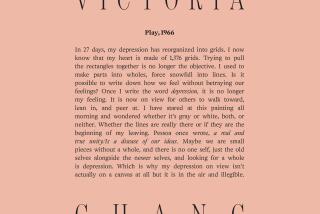At home in the world
- Share via
It may seem a stretch to call Jim Powell’s second collection of poetry, “Substrate” (Pantheon: 138 pp., $26), a book about nature, but that’s exactly what it is. Human nature, philosophical nature, the nature of place and identity, as well as deftly detailed portraits of the physical landscape -- they all form the spine of this remarkable volume, which features 71 poems written over the last 20 years.
Two decades is a long time, the interval between “Substrate” and Powell’s first book, 1989’s “It Was Fever That Made the World,” but the result is a vivid density, a feeling that the pieces here are layered, one atop the other, until “the rings of yearly growth break down in fragments,” as the author writes in “Rates of Combustion,” “the fat years and the lean, / fissure and crumble slowly inward / toward heartwood.” This is a meaty effort, one that takes a wide perspective, whether Powell is offering up an encomium for Jerry Garcia (“Consolation to a Dancer”) or tracing the history of Northern California, as he does in the extended sequence that makes up the last half of the book and channels a succession of voices beginning with the “Mimbres ancients” who “buried family skeletons / prone underneath their pueblo household floors / with broad ceramic bowls inverted over skulls interred / eye sockets upward below their earthen domes, / the inner face a painted hemisphere of art.”
That multiplicity is the most extraordinary thing about “Substrate,” the way the book is big enough for everyone. Powell is as good as they come on the natural world: “The Double Altar on Pine Ridge,” with its imagery of wildfire’s aftermath, is reminiscent of Kenneth Rexroth and Lawrence Clark Powell. And when he invokes Edward Bell, a clerk on HMS Chatham, visiting Monterey in 1792, or Lucy Young, a Native American recalling a massacre by U.S. soldiers, “Substrate” opens up to encompass a collective vision, “a place on the path / I double back to / and catch myself returning / mirrored in a sheet / of water, the world.”
-- David L. Ulin
--
More to Read
Sign up for our Book Club newsletter
Get the latest news, events and more from the Los Angeles Times Book Club, and help us get L.A. reading and talking.
You may occasionally receive promotional content from the Los Angeles Times.








